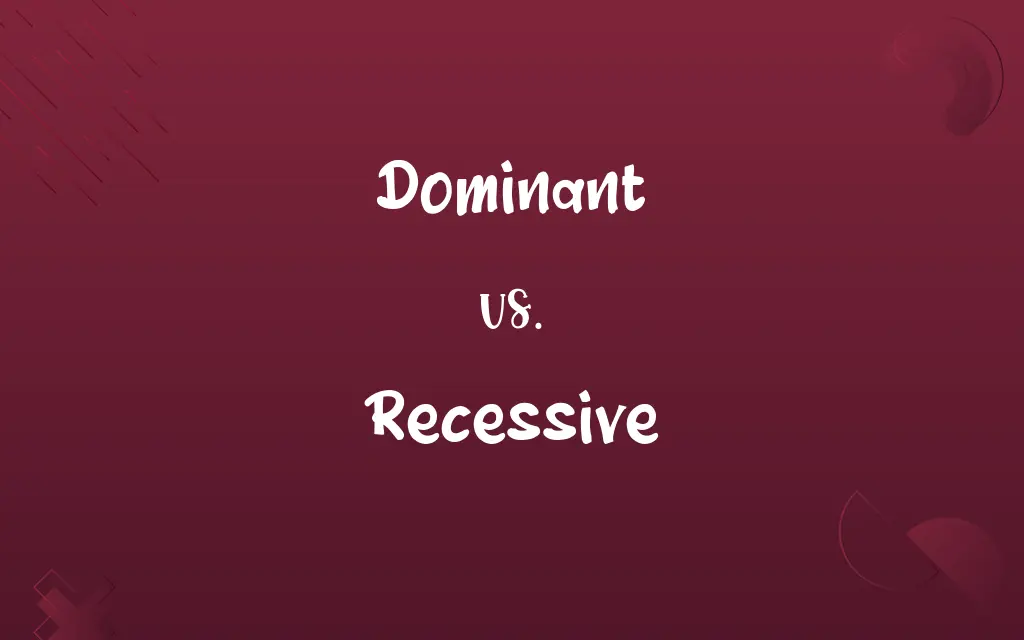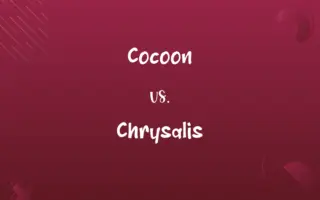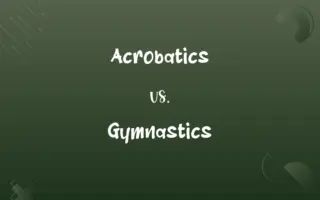Dominant vs. Recessive: Know the Difference

By Shumaila Saeed || Updated on December 25, 2023
Dominant is in genetics, a trait that is expressed in an organism when at least one dominant allele is present. Recessive is a genetic trait that is expressed only when two recessive alleles for the same characteristic are inherited.

Key Differences
Dominant traits in genetics are those that are expressed or visible when a dominant allele is present, even if only one of the two alleles for a trait is dominant. Recessive traits, on the other hand, are only expressed when an individual has two copies of the recessive allele.
Shumaila Saeed
Nov 15, 2023
In the case of dominant traits, the presence of a dominant allele overshadows the presence of a recessive allele. Conversely, recessive traits are masked by the presence of a dominant allele and only appear when the dominant allele is absent.
Shumaila Saeed
Nov 15, 2023
Dominant traits tend to appear more frequently in a population since only one dominant allele is required for the trait to be expressed. Recessive traits may be less common since they require both alleles to be recessive for expression.
Shumaila Saeed
Nov 15, 2023
Examples of dominant traits include dark hair and brown eyes, while recessive traits include red hair and blue eyes. This illustrates how dominant alleles tend to mask the effect of recessive alleles in a heterozygous pair.
Shumaila Saeed
Nov 15, 2023
The concept of dominant and recessive traits is crucial in understanding genetic inheritance and predicting the likelihood of certain traits being passed from parents to offspring.
Shumaila Saeed
Nov 15, 2023
ADVERTISEMENT
Comparison Chart
Allele Requirement
Expressed with at least one dominant allele
Expressed only with two recessive alleles
Shumaila Saeed
Nov 15, 2023
Expression in Heterozygous State
Visible even when paired with a recessive allele
Hidden when paired with a dominant allele
Shumaila Saeed
Nov 15, 2023
Genetic Representation
Represented by a capital letter in genetics
Represented by a lowercase letter in genetics
Shumaila Saeed
Nov 15, 2023
ADVERTISEMENT
Dominant and Recessive Definitions
Dominant
Dominant - Prevalent or most influential in a group or situation.
The dominant player in the game scored the most points.
Shumaila Saeed
Nov 15, 2023
Recessive
Recessive - Not standing out; subdued or in the background.
The recessive colors in the artwork create a calm atmosphere.
Shumaila Saeed
Nov 15, 2023
Dominant
Dominant - In music, relating to the fifth note of a diatonic scale.
The dominant chord in C major is G major.
Shumaila Saeed
Nov 15, 2023
Recessive
Recessive - Less dominant or influential in a situation or group.
The recessive opinion in the meeting was hardly noticed.
Shumaila Saeed
Nov 15, 2023
Dominant
Dominant - In genetics, an allele that is expressed when present.
Brown eye color is a dominant trait in humans.
Shumaila Saeed
Nov 15, 2023
ADVERTISEMENT
Recessive
Recessive - Tending to recede or go back; diminishing or retreating.
The recessive tide left the beach exposed.
Shumaila Saeed
Nov 15, 2023
Dominant
Dominant - Most prominent or conspicuous in a composition or design.
The dominant color in the painting is red.
Shumaila Saeed
Nov 15, 2023
Recessive
Recessive - In genetics, an allele that is masked by a dominant allele.
Blue eyes are a recessive trait in humans.
Shumaila Saeed
Nov 15, 2023
Dominant
Dominant - Having authority or influence over others.
The team's dominant leader made crucial decisions.
Shumaila Saeed
Nov 15, 2023
Dominant
Exercising the most power, control, or influence
The dominant nations during the Cold War.
Shumaila Saeed
Oct 19, 2023
Recessive
(Genetics) Of, relating to, or designating an allele that does not produce a characteristic effect when present with a dominant allele.
Shumaila Saeed
Oct 19, 2023
Dominant
Most abundant or conspicuous; predominant
"[The fireplaces'] shallow brick arches are a relief from the dominant squares and verticals of the windows and doors" (Stephen A. Kliment).
Shumaila Saeed
Oct 19, 2023
Recessive
Of or relating to a trait that is expressed only when the determining allele is present in the homozygous condition.
Shumaila Saeed
Oct 19, 2023
Dominant
Tending to be stronger than its counterpart or used for the most important tasks or in the most pressing situations
Which is your dominant eye? Throw the ball with your dominant arm.
Shumaila Saeed
Oct 19, 2023
Dominant
(Genetics) Of, relating to, or being an allele that produces the same phenotypic effect in heterozygotes as in homozygotes.
Shumaila Saeed
Oct 19, 2023
Dominant
(Ecology) Of, relating to, or being a species that is most characteristic of an ecological community and usually determines the presence, abundance, and type of other species.
Shumaila Saeed
Oct 19, 2023
Dominant
(Music) Relating to or based on the fifth tone of a diatonic scale.
Shumaila Saeed
Oct 19, 2023
Recessive
(by extension) Not dominant; whose effect is masked by stronger effects.
Shumaila Saeed
Oct 19, 2023
Dominant
(Genetics) A dominant allele or a trait produced by a dominant allele.
Shumaila Saeed
Oct 19, 2023
Recessive
Not appearing in the phenotype unless both alleles of the organism have the same trait; - of genetic characteristics, or of the genes coding for such characteristics, in diploid organisms. Opposite of dominant; hemophilia is a recessive trait.
Shumaila Saeed
Oct 19, 2023
Dominant
(music) The fifth major tone of a musical scale (five major steps above the note in question); thus G is the dominant of C, A of D, and so on.
Shumaila Saeed
Oct 19, 2023
Recessive
A genetic trait determined by a recessive{2} allele; a trait not appearing in the phenotype unless both chromosomes of the organism have the same allele; also, an allele which is recessive{2}.
Shumaila Saeed
Oct 19, 2023
Recessive
Of genes; producing its characteristic phenotype only when its allele is identical
Shumaila Saeed
Oct 19, 2023
Recessive
Recessive - Inheritable only when two copies are present.
Albinism is a recessive genetic condition.
Shumaila Saeed
Nov 15, 2023
Dominant
Ruling; governing; prevailing
The dominant party controlled the government.
Shumaila Saeed
Oct 19, 2023
Dominant
Predominant, common, prevalent, of greatest importance.
The dominant plants of the Carboniferous were lycopods and early conifers.
Shumaila Saeed
Oct 19, 2023
Dominant
Preferred and used with greater dexterity than the other, as the right hand of a right-handed person or the left hand of a left-handed one.
Shumaila Saeed
Oct 19, 2023
Dominant
(medicine) Designating the follicle which will survive atresia and permit ovulation.
Shumaila Saeed
Oct 19, 2023
Dominant
Ruling; governing; prevailing; controlling; predominant; as, the dominant party, church, spirit, power.
The member of a dominant race is, in his dealings with the subject race, seldom indeed fraudulent, . . . but imperious, insolent, and cruel.
Shumaila Saeed
Oct 19, 2023
Dominant
The fifth tone of the scale; thus G is the dominant of C, A of D, and so on.
Shumaila Saeed
Oct 19, 2023
Dominant
Exercising influence or control;
Television plays a dominant role in molding public opinion
The dominant partner in the marriage
Shumaila Saeed
Oct 19, 2023
Dominant
Of genes; producing the same phenotype whether its allele is identical or dissimilar
Shumaila Saeed
Oct 19, 2023
Repeatedly Asked Queries
Can a recessive trait appear with one dominant allele?
No, a recessive trait is only expressed when two recessive alleles are present.
Shumaila Saeed
Nov 15, 2023
How is a recessive allele represented?
A recessive allele is typically represented by a lowercase letter in genetics.
Shumaila Saeed
Nov 15, 2023
What's an example of a recessive trait?
Blue eye color is a common example of a recessive trait.
Shumaila Saeed
Nov 15, 2023
How is a dominant allele represented?
A dominant allele is typically represented by a capital letter in genetics.
Shumaila Saeed
Nov 15, 2023
Can someone carry a recessive trait without expressing it?
Yes, an individual can be a carrier of a recessive trait without showing it.
Shumaila Saeed
Nov 15, 2023
What is a dominant trait?
A dominant trait is a genetic characteristic that is expressed when at least one dominant allele is present.
Shumaila Saeed
Nov 15, 2023
What's an example of a dominant trait?
Brown eye color is a common example of a dominant trait.
Shumaila Saeed
Nov 15, 2023
Are dominant traits always more common?
Dominant traits tend to be more common, but not always, depending on the population.
Shumaila Saeed
Nov 15, 2023
Can two parents with a recessive trait have a child with a dominant trait?
No, if both parents have only recessive alleles, they can't have a child with a dominant trait.
Shumaila Saeed
Nov 15, 2023
Is hair color a dominant or recessive trait?
Hair color can be influenced by both dominant and recessive genes.
Shumaila Saeed
Nov 15, 2023
Is eye color solely determined by dominant and recessive genes?
Eye color is primarily influenced by dominant and recessive genes but can be complex.
Shumaila Saeed
Nov 15, 2023
Are dominant alleles always healthier than recessive?
No, dominance in genetics doesn’t imply that one allele is healthier than another.
Shumaila Saeed
Nov 15, 2023
Is blood type an example of dominant and recessive inheritance?
Yes, blood types are influenced by dominant and recessive genetic patterns.
Shumaila Saeed
Nov 15, 2023
Can a dominant trait skip generations?
It's less likely for dominant traits to skip generations, unlike recessive traits.
Shumaila Saeed
Nov 15, 2023
Can two people with dominant traits have a child with a recessive trait?
Yes, if both parents are carriers of the recessive allele.
Shumaila Saeed
Nov 15, 2023
Are personality traits determined by dominant and recessive genes?
Personality traits are influenced by a combination of genetics and environment, not just dominant or recessive genes.
Shumaila Saeed
Nov 15, 2023
Can a child have a recessive trait if one parent has a dominant trait?
Yes, if the other parent contributes a recessive allele and the child inherits two recessive alleles.
Shumaila Saeed
Nov 15, 2023
Do dominant traits guarantee transmission to offspring?
Dominant traits have a higher chance but are not guaranteed to be passed on.
Shumaila Saeed
Nov 15, 2023
Are all genetic diseases caused by recessive genes?
No, genetic diseases can be caused by both dominant and recessive genes.
Shumaila Saeed
Nov 15, 2023
Can environmental factors influence dominant and recessive traits?
Environmental factors don't change the genetic basis of these traits but can influence their expression.
Shumaila Saeed
Nov 15, 2023
Share this page
Link for your blog / website
HTML
Link to share via messenger
About Author
Written by
Shumaila SaeedShumaila Saeed, an expert content creator with 6 years of experience, specializes in distilling complex topics into easily digestible comparisons, shining a light on the nuances that both inform and educate readers with clarity and accuracy.
































































